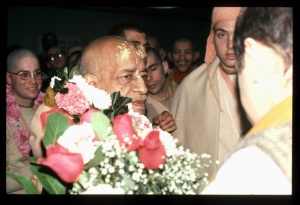CC Madhya 6.198 (1975): Difference between revisions
(Vanibot #0027: CCMirror - Mirror CC's 1996 edition to form a basis for 1975) |
(Vanibot #0020: VersionCompareLinker - added a link to the Version Compare feature) |
||
| Line 2: | Line 2: | ||
<div style="float:left">'''[[Sri Caitanya-caritamrta (1975)|Śrī Caitanya-caritāmṛta (1975)]] - [[CC Madhya (1975)|Madhya-līlā]] - [[CC Madhya 6 (1975)|Chapter 6: The Liberation of Sārvabhauma Bhaṭṭācārya]]'''</div> | <div style="float:left">'''[[Sri Caitanya-caritamrta (1975)|Śrī Caitanya-caritāmṛta (1975)]] - [[CC Madhya (1975)|Madhya-līlā]] - [[CC Madhya 6 (1975)|Chapter 6: The Liberation of Sārvabhauma Bhaṭṭācārya]]'''</div> | ||
<div style="float:right">[[File:Go-previous.png|link=CC Madhya 6.197 (1975)|Madhya-līlā 6.197]] '''[[CC Madhya 6.197 (1975)|Madhya-līlā 6.197]] - [[CC Madhya 6.199 (1975)|Madhya-līlā 6.199]]''' [[File:Go-next.png|link=CC Madhya 6.199 (1975)|Madhya-līlā 6.199]]</div> | <div style="float:right">[[File:Go-previous.png|link=CC Madhya 6.197 (1975)|Madhya-līlā 6.197]] '''[[CC Madhya 6.197 (1975)|Madhya-līlā 6.197]] - [[CC Madhya 6.199 (1975)|Madhya-līlā 6.199]]''' [[File:Go-next.png|link=CC Madhya 6.199 (1975)|Madhya-līlā 6.199]]</div> | ||
{{CompareVersions|CC|Madhya 6.198|CC 1975|CC 1996}} | |||
{{RandomImage}} | {{RandomImage}} | ||
==== TEXT 198 ==== | ==== TEXT 198 ==== | ||
| Line 32: | Line 31: | ||
<div class="purport"> | <div class="purport"> | ||
That Kṛṣṇa is all-attractive is verified by the activities of the four ṛṣis and Śukadeva Gosvāmī. All of them were liberated persons, yet they were attracted by the qualities and pastimes of the Lord. It is therefore said | That Kṛṣṇa is all-attractive is verified by the activities of the four ṛṣis and Śukadeva Gosvāmī. All of them were liberated persons, yet they were attracted by the qualities and pastimes of the Lord. It is therefore said: muktā api līlayā vigrahaṁ kṛtvā bhagavantaṁ bhajante. ([[CC Madhya 24.112 (1975)|Cc. Madhya 24.112]]) Even liberated persons are attracted by the pastimes of Lord Kṛṣṇa and thus engage in devotional service. From the very beginning of their lives, Śukadeva Gosvāmī and the four Kumāras, known as catuḥ-sana, were liberated and self-realized on the Brahman platform. Nonetheless, they were attracted by the qualities of Kṛṣṇa, and they engaged in His service. The four Kumāras were attracted by the aroma of the flowers offered at the lotus feet of Kṛṣṇa, and in this way they became devotees. Śukadeva Gosvāmī heard Śrīmad-Bhāgavatam by the mercy of his father, Vyāsadeva, and he was consequently attracted to Kṛṣṇa and became a great devotee. The conclusion is that the transcendental bliss experienced in the service of the Lord must be superior to brahmānanda, the bliss derived from realizing the impersonal Brahman. | ||
</div> | </div> | ||
Latest revision as of 18:43, 27 January 2020

A.C. Bhaktivedanta Swami Prabhupada
TEXT 198
- sanakādi-śukadeva tāhāte pramāṇa
- ei-mata nānā artha karena vyākhyāna
SYNONYMS
sanaka-ādi—the four Sanas; śukadeva—and Śukadeva Gosvāmī; tāhāte—in that; pramāṇa—the evidence; ei-mata—in this way; nānā—varieties; artha—meaning; karena—does; vyākhyāna—explanation.
TRANSLATION
Śrī Caitanya Mahāprabhu explained the meaning of the verse by giving evidence concerning Śukadeva Gosvāmī and the four ṛṣis Sanaka, Sanat-kumāra, Sanātana and Sanandana. Thus the Lord gave various meanings and explanations.
PURPORT
That Kṛṣṇa is all-attractive is verified by the activities of the four ṛṣis and Śukadeva Gosvāmī. All of them were liberated persons, yet they were attracted by the qualities and pastimes of the Lord. It is therefore said: muktā api līlayā vigrahaṁ kṛtvā bhagavantaṁ bhajante. (Cc. Madhya 24.112) Even liberated persons are attracted by the pastimes of Lord Kṛṣṇa and thus engage in devotional service. From the very beginning of their lives, Śukadeva Gosvāmī and the four Kumāras, known as catuḥ-sana, were liberated and self-realized on the Brahman platform. Nonetheless, they were attracted by the qualities of Kṛṣṇa, and they engaged in His service. The four Kumāras were attracted by the aroma of the flowers offered at the lotus feet of Kṛṣṇa, and in this way they became devotees. Śukadeva Gosvāmī heard Śrīmad-Bhāgavatam by the mercy of his father, Vyāsadeva, and he was consequently attracted to Kṛṣṇa and became a great devotee. The conclusion is that the transcendental bliss experienced in the service of the Lord must be superior to brahmānanda, the bliss derived from realizing the impersonal Brahman.